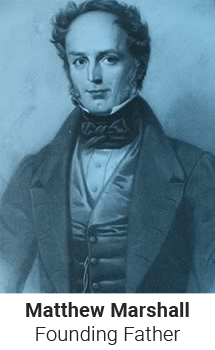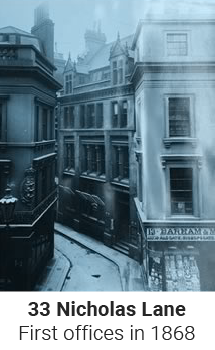READ MORE
History
Tullett Prebon has a long history dating back over 150 years and involves many of the most celebrated names in the history of money broking.


Tullett Prebon's origins can be traced back to 1866 when Matthew Marshall Junior – whose father had served as chief cashier of the Bank of England for 30 years – set up in partnership with Joseph Rich, trading as Rich, Marshall & Co., East India exchange and discount brokers, at 33 Nicholas Lane, EC4.
Four years later, Matthew Marshall Jr. continued in business on his own account under the name Marshall & Sons. This original exchange broking business runs like a thread through the evolution of the firm and still forms a core commercial activity of the inter-dealer broker (IDB) known as Tullett Prebon, which now also embraces money market loans and deposits, bonds, equities and commodities, and their derivatives.
Foreign exchange dealing was suspended in London during the Second World War
Tullett Prebon's origins can be traced back to 1866
Mercantile House Holdings in 1979
Mercantile House and International City Holdings
Financial conglomerates Mercantile House and International City Holdings provided consolidation platforms for a number of independent broking houses between 1979 and 1989.
Mercantile House’s acquisitions included: New York-based money brokers Lasser Bros (1977) and Fundamental Brokers (1980); Woellwarth & Co. (1979); the commodities and financial futures brokers Woodstock Inc. (1980) in Chicago and R.J Rouse & Co. in London (1981); Swiss-based money broker Cosmorex (1981) and New York-based securities brokerage and fund manager Oppenheimer & Co. (1982).
In 1987, Mercantile agreed to a £490m takeover from UK financial services group British & Commonwealth, which proposed to retain the Oppenheimer fund management business and dispose of the Marshall’s money and foreign exchange broking businesses, which was now ranked as the world’s second-largest money broker. M. W. Marshall & Co. was sold two years later to a management-led consortium.
In 1982 Mercantile had also acquired rival broker Charles Fulton & Co. but chose not to merge it with its M. W. Marshall & Co. business. Instead it broke up Fulton by permitting the operating companies in the UK, Europe, Middle East and Asia to arrange individual management buy-outs. The Marshall and Fulton businesses were not to be merged until 1999.
Charles Fulton (UK) was formed in 1982 to purchase the UK businesses. It also quickly acquired Fulton’s Middle East operations and in 1984, it bought Mabon Nugent Godsell, the third largest money brokers in the US, which was renamed Prebon Money Brokers. Fulton also bought back its former European operations, primarily based in Switzerland and Luxembourg, rebranded as Fulton Prebon and changed its holding company name to International City Holdings (ICH) ahead of a successful stock market flotation in 1985. ICH completed the reconstruction of its worldwide dealing network by buying Charles Fulton (Asia) in 1986.
In 1985, the Bank of England named Fundamental & Marshall Brokers, Charles Fulton (IDB), Mabon, Nugent International (Gilts) and Tullett & Tokyo (Gilts) as among the six financial groups firms recognised as eligible to operate as inter-dealer brokers (IDBs), a new form of intermediary in the restructured British government securities market. The move came ahead of the deregulation of the London financial markets in 1986, which included the abolition of fixed commission charges and of the distinction between stockjobbers and stockbrokers on the London Stock Exchange and change from open-outcry to electronic, screen-based trading.
In 1990, ICH was acquired by York Trust Group and integrated its London money broking operations as Babcock Fulton Prebon at 155 Bishopsgate, London EC2 - which remains the location of Tullett Prebon today
Prebon Marshall Yamane
In 1990, ICH was acquired by York Trust Group, a financial services group that had previously acquired the UK operations of Babcock & Brown in 1988 and money broker Kirkland-Whittaker in 1989. York Trust integrated its London money broking operations as Babcock Fulton Prebon at 155 Bishopsgate, London EC2 – which remains the location of Tullett Prebon today – and also changed its group name to Babcock Prebon plc.
The following year Babcock Prebon plc went into receivership and its brokerage subsidiary and futures business were bought out by its management as Babcock Fulton Prebon. In 1992, the firm changed its group name to Prebon Yamane (UK) to recognise its relationship with the Yamane group of companies in Japan.
In 1999, Prebon Yamane and MW Marshall & Co agreed to merge their international broking operations. The newly merged company – known as Prebon Marshall Yamane in America and Europe and Prebon Yamane in Asia – created the largest OTC broking group of the time, globally broking an underlying value exceeding US$55 trillion annually.
In 1999, Tullett & Tokyo Forex merged with Liberty Brokerage Investment Corp. of the US to create one of the world’s leading money brokers.
Tullett & Tokyo Liberty
During its early years Tullett & Riley had focused on the money and foreign exchange markets. It developed a number of overseas offices and expanded its operations as an intermediary in the wholesale financial markets, in particular developing its product range into interest rate derivatives. In 1983, The Tokyo Forex Company, Japan’s largest money broker, took a major stake in Tullett & Riley through an investment and an exchange of shares. The firm changed its name to Tullett & Tokyo Forex International.
In 1999, Tullett & Tokyo Forex merged with Liberty Brokerage Investment Corp. of the US to create one of the world’s leading money brokers.
Liberty was a privately held company founded in 1986 by a majority of the primary US government securities dealers and was one of the two largest inter-dealer brokers in US treasury securities, with a share of just under 35% of the market. The merged firm was named Tullett & Tokyo Liberty.
In 2003, Collins Stewart acquired Tullett, the international inter-dealer broker, for £250 million.
Collins Stewart
In 1991, the stockbroking partnership Collins Stewart & Co. had been launched as a corporate partnership between UK investment bank Singer & Friedlander and its management. Singer & Friedlander later acquired the entire issued share capital of the Collins Stewart but agreed to a management buy-out for £122 million in 2000. Six-months later, the new firm Collins Stewart Holdings plc was successfully floated at a value of £326 million.
In 2003, Collins Stewart acquired Tullett, the international inter-dealer broker, for £250 million. The new company was named Collins Stewart Tullett plc. A year later, Collins Stewart Tullett acquired Prebon Yamane, the world’s fourth largest inter-dealer broker, for £132 million to form the world’s second largest inter-dealer broking business. The integration of the Tullett Liberty and Prebon businesses was completed during 2005 and re-branded Tullett Prebon.
In 2006 Collins Stewart Tullett pl changed its name to Tullett Prebon plc
Tullett Prebon
In 2006, the stockbroking business Collins Stewart was demerged and listed on the London Stock Exchange as Collins Stewart plc, while Collins Stewart Tullett plc changed its name to Tullett Prebon plc. Immediately prior to demerger, the company was worth £1.8 billion. Terry Smith, former Chief
Executive of Collins Stewart Tullett became Chief Executive of Tullett Prebon plc and Chairman of Collins Stewart plc.
The IDB business now trades as Tullett Prebon in most jurisdictions and utilises common systems, infrastructure and facilities in virtually all locations. The voice broking business is organised on a regional and then a product basis, while the electronic broking business “Tullett Prebon Electronic Broking” and the data sales business “Tullett Prebon Information” are managed globally.
During 2015 Tullett Prebon Group announced that it would acquire the ICAP voice broking business. The deal completed on 30 December 2016 and Tullett Prebon plc was renamed TP ICAP Group
TP ICAP
TP ICAP group incorporates some of the most respected brands in the sector, each with a separate and distinct offering. Our businesses compete with each other which means that our clients always get world-class service from each of them, as well as access to industry-leading execution services.
For more information on TP ICAP group please visit our website www.tpicap.com

